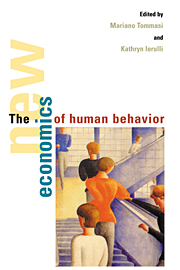Book contents
- Frontmatter
- Contents
- Contributors
- Preface
- Introduction
- PART I DISCRIMINATION AND IMMIGRATION
- PART II CRIME, PUNISHMENT, AND RIGHTS
- 3 Rational criminals and profit-maximizing police: the economic analysis of law and law enforcement
- 4 Property rights in children
- PART III ALL IN THE FAMILY
- PART IV GOVERNMENT AND POLITICS
- PART V HEALTH, RELIGION, AND MASS BEHAVIOR
- Index
4 - Property rights in children
Published online by Cambridge University Press: 03 December 2009
- Frontmatter
- Contents
- Contributors
- Preface
- Introduction
- PART I DISCRIMINATION AND IMMIGRATION
- PART II CRIME, PUNISHMENT, AND RIGHTS
- 3 Rational criminals and profit-maximizing police: the economic analysis of law and law enforcement
- 4 Property rights in children
- PART III ALL IN THE FAMILY
- PART IV GOVERNMENT AND POLITICS
- PART V HEALTH, RELIGION, AND MASS BEHAVIOR
- Index
Summary
In modern Western societies nearly everyone has a full set of civil rights. This contrasts greatly with earlier societies, in which most persons were lacking some portion of full civil rights. The English historians, Frederick Pollack and Frederick Maitland, writing about thirteenth-century England, describe this situation:
Of the diverse sorts and conditions of men our law of the thirteenth century has much to say; there are many classes of persons which must be regarded as legally constituted classes. Among laymen the time has indeed already come when men of one sort, free and lawful men (liberi et legales homines) can be treated as men of the common, the ordinary, we may perhaps say the normal sort, while men of all other sorts enjoy privileges or are subject to disabilities which can be called exceptional. The lay Englishman, free but not noble, who is of full age and who has forfeited none of his rights by crime or sin, is the law's typical man, typical person. But besides such men there are within the secular order noble men and unfree men; then there are monks and nuns who are dead to the world; then there is the clergy constituting a separate “estate”; there are Jews and there are aliens; there are excommunicates, outlaws and convicted felons who have lost some or all of their civil rights; also we may make here motion of infants and of women, both married and unmarried, even though their condition be better discussed in connection with family law.
(vol. 1, p. 407)- Type
- Chapter
- Information
- The New Economics of Human Behaviour , pp. 59 - 74Publisher: Cambridge University PressPrint publication year: 1995



